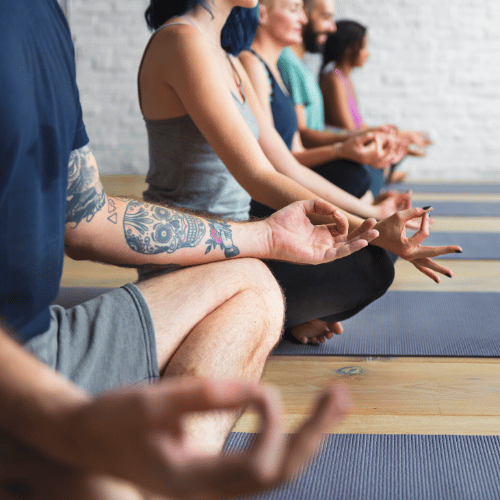Yoga For Addiction Recovery is one of many powerful tools that can be used as a part of the treatment for substance abuse disorder. According to Addictioncenter.com, addiction is a major problem in America. 17 million Americans report alcohol abuse annually. Opioids like heroin, fentanyl, and morphine cause tens of thousands of deaths annually.
Not only have family members lost loved ones, substance use disorders cost Americans over $740 billion per year. This has resulted in many campaigns against substance abuse, along with treatments that can help. Holistic treatments like mediation and yoga, have become increasingly valuable treatments for substance abuse alongside traditional medications and Cognitive Behavioral Therapy.
Yoga is the Sanskrit word for union. Yoga is a physical and spiritual union between the mind and body that often includes philosophies echoing themes in 12-Step programs (i.e. belief in a higher power, prayer, meditation, humility, spiritual awakenings, and surrender). Yoga is a practice that combines physical activity and physical postures, breathing, awareness, mindfulness, and meditation.

It has gained popularity in the West in recent years after having been an Eastern practice for thousands of years. In addition to prompting relaxation, yoga supports a lifestyle of calmness, mindfulness, and self-comparison. The result of such a centering practice is a renewed mind, realization and grounded emotions.
Yoga centers on wisdom and offers guidelines for living a meaningful and purposeful life. Yoga does not require a belief in a higher power, or prayer (although it is considered to be a spiritual practice as it has a 5,000-year history in ancient Indian philosophy). These are options one may choose to implement into their practice. [1]
Understanding Yoga For Addiction Recovery
One of the great things about yoga is that it doesn’t require expensive equipment or a special location; it can be practiced pretty much anywhere at any time as needed.
The most common form of yoga practiced in America today is likely hatha yoga, which focuses on physical postures and breathing techniques, the American Yoga Association publishes. [2] When first learning yoga, it is helpful to attend a class or find a trained yoga instructor. Classes are generally 45 minutes to 1.5 hours, and focus on achieving specific postures while controlling breathing in certain ways. By posing the body in a specific way, the flow of energy is said to be opened as the spine and other parts of the body are properly aligned. This allows the mind to open up, creating balance between mind and body.
While yoga is not a religion, it can be spiritual as individuals may experience spiritual growth through practicing yoga regularly. Yoga can be practiced by anyone on an as-needed basis and is thought to increase the bond between mind, body, and soul.
Benefits of practicing Yoga For Addiction Recovery
The Yoga Journal describes modern yoga as the use of physical postures to learn how to connect mind, body, and breath to gain self-awareness and focus attention inward. According to data published by US News & World Report, around 21 million Americans practice yoga, a number that has doubled in the past 10 years. [3]
Yoga has many potential benefits, including:
- Stress relief
- Increased physical stamina and strength
- Self-reflection and increased self-awareness
- Healthier exercise and eating habits
- Heightened self-confidence and improved self-image
- Pain relief
- Better sleep
- Increased energy levels
- Reduction in fatigue
- Emotional healing
- Overall health and wellness improvement
Yoga For Addiction Recovery and the brain
According to the American Addiction Centers, when someone abuses drugs or alcohol regularly, some of the pathways in the brain are altered, and the pathways related to feeling pleasure, regulating emotions, making sound decisions, and controlling impulses may be negatively affected. After a period of time without the influence of drugs or alcohol, brain chemistry and circuitry can heal and rebuild themselves. Yoga may be able to help with this as well. [4]
Yoga has long been used to help relieve stress, and scientific evidence has provided a link between practicing yoga and the reduction of stress by modulation of the stress response, Harvard Health reports. [5] When a person feels stress, heart rate, blood pressure, respiration, and body temperature increase. Yoga may actually act on this system by regulating and balancing some of the stress hormones like cortisol and adrenaline, the Yoga Journal publishes. Grey matter and regions of the brain active in controlling stress, like the hippocampus, may also be enlarged with the regular practice of yoga, as published in Scientific American. [6]

The Journal of Alternative and Complementary Medicine also reported on a study that showed an increase in the levels of gamma-aminobutyric acid (GABA) with the practice of yoga techniques. GABA is a kind of natural tranquilizer produced by the brain to help manage anxiety and stress response. Higher levels of GABA usually mean less anxiety and less stress. Stress, anxiety, and depression are common side effects of drug withdrawal, and the use of yoga in recovery may actually work to improve these symptoms. [7]
A study published by Harvard Health on a group of women who reported themselves to be “emotionally distressed” practiced yoga for 1.5 hours twice a week. At the end of three months, half reported less depression, a third cited fewer anxiety symptoms, and 65 percent claimed an increase in overall wellbeing. Over 80 percent of the people practicing yoga in the United States, according to a National Health Interview Study (NHIS) in 2012 published by the National Center for Complementary and Integrative Health (NCCIH), [8] reported a reduction in their stress levels as a result. [5]
Yoga For Addiction Recovery
Addictioncenter.com states that by introducing routine and breathing to the mind and body, yoga and meditation have been thought of as a path to release physical and emotional pain. Different yogic practices have their own beliefs on substance abuse. Such yogic principles believe drugs interfere with consciousness and interrupt the body’s energy centers, and which produces toxins. Students of Kundalini yoga are instructed to not practice substance abuse as “energies in the body may spiral out of control” hence their abstinence from drugs.
These traits are all useful to individuals battling substance abuse as yoga centers and grounds the mind. This means yoga creates a sense of ease and connection despite the highs of excitement and the lows of depression. Because someone is connecting the body while taking deep breaths, he or she can feel endorphins, or “feel-good hormones” which create a natural high throughout the brain. [1]

As claimed by Addictioncenter.com, a woman who practiced yoga while recovering from addiction notes: “I walked out of class feeling new, grounded, balanced, alive, and more than anything, feeling like I was going to be okay. I loved it, LOVED it”. She returned later because she found that yoga provided less reactivity, a safe community, and the ability to control her thoughts. These were a few of the many benefits of yoga post-addiction, and many of them have decreased her anxiety and insomnia. I also gave her a different life perspective and taught her lessons about her willpower. [1]
Reclaim your life By practicing Yoga For Addiction Recovery
Substance abuse disorder is a condition that can cause major health, social, and economic problems that should not be taken lightly. We Level Up Treatment Center can provide you, or someone you love, Yoga For Addiction Recovery with professional and safe supervision. Feel free to call us to speak with one of our counselors. We can inform you about this condition by giving you relevant information. Our specialists know what you are going through. Please know that each call is private and confidential.
Sources:
[1] ‘Yoga For Substance Abuse Treatment’ – (Addictioncenter.com)
[2] American Yoga Association – (Americanyogaassociation.net)
[3] ‘Yoga 101: A Beginner’s Guide to Practice, Meditation, and the Sutras’ – Yoga Journal (Yogajournal.com)
[4] ‘Using Yoga in Recovery’ – American Addiction Centers (Americanaddictioncenters.org)
[5] Harvard Health Publishing: Harvard Medical School (Health.harvard.edu)
[6] ‘How Yoga Changes the Brain’ – Scientific American (Scientificamerican.com)
[7] Streeter, C. C., Whitfield, T. H., Owen, L., Rein, T., Karri, S. K., Yakhkind, A., Perlmutter, R., Prescot, A., Renshaw, P. F., Ciraulo, D. A., & Jensen, J. E. (2010). Effects of yoga versus walking on mood, anxiety, and brain GABA levels: a randomized controlled MRS study. Journal of alternative and complementary medicine (New York, N.Y.), 16(11), 1145–1152. – U.S. National Library of Medicine (Ncbi.nlm.nih.gov)
[8] ‘National Survey Finds People Use Dietary Supplements and Yoga for Wellness Reasons, Chiropractic for Treating a Condition’ – National Center for Complementary and Integrative Health (NCCIH) (Nccih.nih.gov)